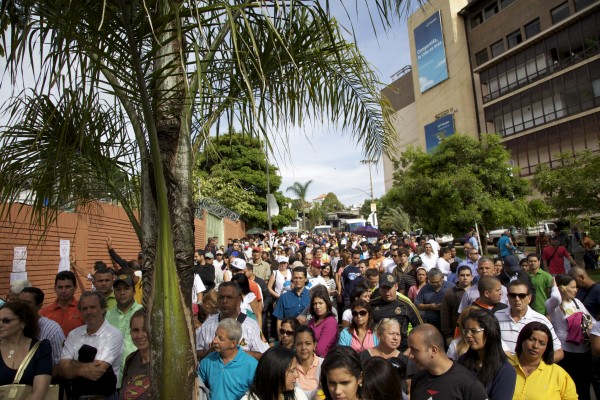By now everyone knows that President Chavez won the presidential election in Venezuela. In one sense, we can say that “the people” (el pueblo) have won on Oct 7. However, these words do not reflect the entire experience. The most interesting thing about this election is its rather impressive process. Which country in the world has 97% of its population (over 19 million people) registered to vote? And when did you last hear that over 82% of the registered voters in a country actually went to a polling booth of their own free will, waited in line, sometimes for hours, before casting their votes? This Venezuelan election is a very good example of a well-functioning democracy. The quality of the voting system is also worth mentioning. Venezuela has one of the most modern and highly computerized voting system of anywhere in the world. The Carter Foundation noted that many Venezuelans were concerned that this new electronic voting system might enable authorities to tell how individuals voted, exposing them to retaliation if they voted against Chavez. “This concern has no basis, however…” the center said. “The software of the voting machines guarantees the secrecy of the vote.”
Let’s come back to the democratic demonstration effect. This is really the thing that can be useful for all people interested in democracy, whether they live in Venezuela or not. Even if we wanted to, we can’t export Chavez to another country. But, we should study seriously the work done. Why did Venezuelans living in Colombia walk for hours and crossed rivers on foot to get to Venezuela to vote? Why, even when the border was closed for security reasons, did people fly in from Hong Kong to vote? Why were people in Miami crying when they heard the results as if they had just lost a loved one? What is it that moved people in this way? A French journalist covering the election in Caracas, with all his “knowledge and experience,” was very quick to explain that the “problem” was that the election was very polarized. But what choices did the Venezuelan people have? Of course the election will be polarized if not we don’t have any real choices – choices that people can connect with – different ideas that have been clearly articulated and most importantly, choices that present a different vision of the future. That is why the elections in Venezuela are so interesting time and time again. Everyone in his/her own way was connected, and knew the importance of the election. Over 5,000 journalists were covering the event. Merill Lynch even sent a letterto their clients a week before the election telling them that Chavez was expected to win with a 10% margin, and that they should invest accordingly. This is geopolitics at its best. Imagine if Henrique Capriles, the opposition candidate, had won the election… how that would have impacted the relationship with Colombia and the United States, how the development of US military bases would have expanded in Latin America, what would have happened to the free trade agreement and so on… These were the real options on the table. Similar questions and choices also existed at the local level – e.g., whether help would be available from the government to neighborhood councils for the development of housing and parks, and organize access to healthcare and education. In the last decade, the country reduced its “poorest” population from 50% to 20%. Of course, these developments have utilized the returns from the oil industry, and some “western experts” have expressed their concerns that this situation is unsustainable. Do we have to remind these “experts” that the US had to have a bailout, that the government had to intervene by refinancing the fifth largest US banks to avoid a world economy collapse and that the US government owes trillions of dollars to China? The European and US economy are the ones that are truly unsustainable, and are surviving artificially, only by the help of cheap labor and resources and credits from Asia, Africa and South America. The US now has 40% of its population at or below the poverty level, and can’t really make a case for its economic system.
A Mexican member of the International Observer Delegation said that in his view, the elections in Venezuela were like the one in South Africa, when people went en masse to elect Nelson Mandela and thus put an end to the apartheid. I also remember conversations in Chile after the campaign “No a Pinochet” and the first elections after 17 years of dictatorship, where it would have be very interesting if there was a way to measure the energy with which people cast their ballots!
People are mobilizing themselves, registering to vote and voting, when real alternatives and proposals are presented to them. How can we explain that the main issues during the election campaigns in Europe and the US are taxes and budget? Are these democratic elections or are we voting to choose our next CFO? Where is the ideological discussion? Where is the global project? What future are we constructing? What are we doing about the one billion people suffering from poverty and anger in the world?
These were the subjects that were on the table in this democratic Venezuelan election. Long live Venezuela and its democracy! May it be an example for the rest of us.






